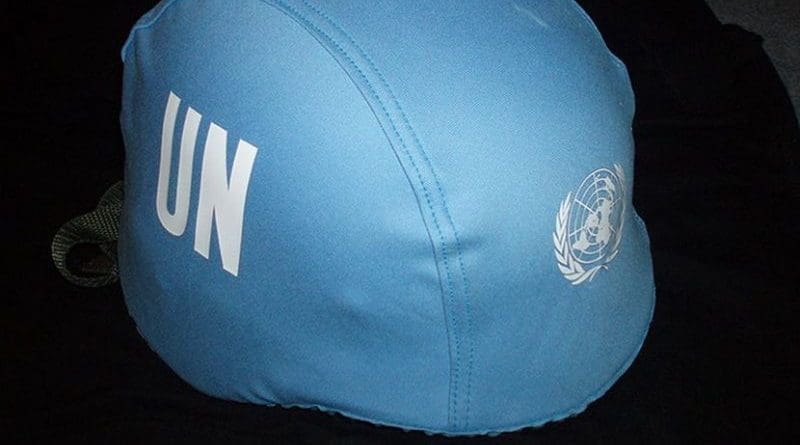Pakistan’s Contributions To UN Peacekeeping Operations – OpEd
By Khalid Iqbal
United Nations (UN) peacekeeping operations play a pivotal role in maintaining global peace and security. Nations around the world contribute troops, police personnel, and resources to support these missions. Pakistan has been a consistent and substantial contributor to UN peacekeeping operations since the early days of its involvement. This article explores Pakistan’s role as a leading contributor, its contributions to regional peace and security, the humanitarian aspect of peacekeeping, the impact on Pakistan’s international relations, the challenges and risks faced, and the way forward in strengthening its role.
Pakistan’s involvement in UN peacekeeping operations dates back to its early years as an independent nation. It has actively participated in missions during significant international conflicts. Pakistani troops were dispatched to the Congo (now the Democratic Republic of Congo) in the 1960s during the Congo Crisis, marking the country’s entry into UN peacekeeping. Since then, Pakistan has consistently supported UN peacekeeping missions and made valuable contributions.
One of the most noteworthy aspects of Pakistan’s involvement in UN peacekeeping is its consistent ranking as one of the top contributors. Pakistani troops, police personnel, and civilian experts have been deployed to numerous regions across the globe. As of recent data, Pakistan maintains a significant presence in UN peacekeeping missions, emphasizing its dedication to international peace and security. The country’s contributions extend beyond numbers and encompass a wide range of expertise and skills that are crucial for mission success.
Contributions to Regional Peace and Security
Pakistani peacekeepers have been deployed in critical conflict zones, playing a vital role in maintaining peace and stability. For example, Pakistani troops have served in missions in countries like Sierra Leone, Liberia, and the Ivory Coast. They have supported post-conflict efforts, demobilization, and the establishment of law and order. Pakistani peacekeepers have often found themselves working under challenging circumstances, yet they have earned international recognition for their professionalism, dedication, and effectiveness.
In addition to their peacekeeping roles, Pakistani troops have been actively engaged in humanitarian assistance. This includes providing medical support, relief work, and interacting with local communities. Pakistani peacekeepers understand the importance of building relationships with the communities they serve. These interactions not only help foster goodwill but also contribute to the stability and development of the regions where they are stationed. In many cases, Pakistani peacekeepers have played a crucial role in rebuilding societies and infrastructure.
Pakistan’s active involvement in UN peacekeeping has a significant impact on its international image and diplomatic relations. Contributing to global peace efforts enhances the country’s standing on the international stage. It strengthens diplomatic ties with various nations and international bodies, promoting cooperation on other global issues as well. Collaborations with UN organizations and fellow contributing countries showcase Pakistan’s commitment to shared goals of peace and security.
Challenges and Risks
While UN peacekeeping missions are instrumental in maintaining global peace, they come with inherent challenges and risks. Pakistani peacekeepers often serve in conflict zones where their safety is at risk. Hostile environments, political complexities, and the presence of non-state armed groups can pose serious threats. The safety of peacekeepers is a paramount concern, and the international community recognizes the sacrifices made by these brave individuals.
To continue strengthening its role in UN peacekeeping operations, Pakistan should consider various measures. One aspect is providing further specialized training to its peacekeeping personnel, equipping them with the skills required for modern conflict zones. Additionally, Pakistan should explore opportunities to contribute to roles that are in high demand in peacekeeping missions, such as medical services, engineering, and logistics support. Strengthening cooperation with the UN and fellow contributing countries is crucial to addressing common challenges and ensuring the safety and effectiveness of peacekeepers.
Conclusion
Pakistan’s contributions to UN peacekeeping operations reflect its unwavering commitment to global peace and security. The nation’s role as a leading contributor, its impact on regional peace and security, the humanitarian aspect of its peacekeeping missions, and the benefits it reaps for its international relations underscore the significance of its involvement. However, this engagement is not without its challenges and risks, emphasizing the need for continuous improvement and adaptation. As the world faces evolving security threats and crises, Pakistan’s dedication to peacekeeping is an example for nations worldwide. It is a testament to the country’s resolve to make the world a safer place for all. Pakistan’s contributions to UN peacekeeping are a source of national pride and an embodiment of its commitment to peace, stability, and humanity.


Pakistan’s contribution “for peace keeping” is a joke. It wastes much of its scarce resources in fermenting conflicts in the neighbourhood and beyond, thereby resulting in national insolvency.